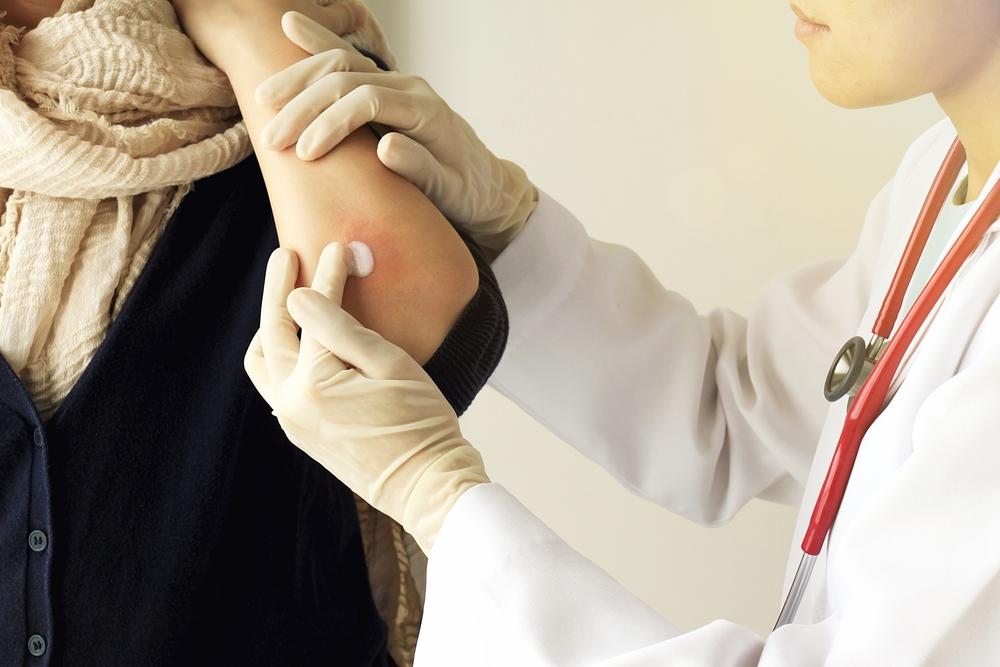Tues: 8:30am - 3:00pm
Wed: 12:00pm - 6:00pm
Thurs: 8:30am - 3:00pm
Fri: Closed
Sat: 8:30am - 12:30pm
Sun: Closed
Greenvale, NY 11548
Eczema: Learn the Symptoms and Triggers of Skin Inflammation


October is National Eczema Month. This is a time when the medical community, dermatologists especially, work with the public to explain the skin conditions collectively known as eczema, as well as the causes and treatments.
While eczema seldom poses any significant health risk, it can impact quality of life in a number of ways, including uncomfortable itching and embarrassment at the rash that often appears on the affected area.
What is Eczema?
The National Eczema Association defines eczema as a group of conditions that cause the skin to become itchy, inflamed, or to have a rash-like appearance. There are six main types of eczema:
Atopic dermatitis, a chronic skin rash that often affects children and may be accompanied by asthma or hay fever.
Contact dermatitis, a red, itchy rash triggered by an allergic reaction to a substance touching the skin.
Dyshidrotic eczema, small blisters that typically appear on the hands and sometimes the feet.
Nummular eczema, round or oval lesions that may appear like coins raised on the skin.
Seborrheic dermatitis, an itchy, sometimes painful rash on the scalp.
Stasis dermatitis, a long-term inflammatory condition appearing on the lower legs.
All are triggered by an irritant or allergen that activates the body’s immune system. This is what causes skin inflammation, itching and discomfort as the body fights off the irritant.
Eczema is a common skin problem. More than 31 million Americans live with some form of eczema, or about 10 percent of the U.S. population. Eczema may begin at any stage in life. Symptoms can range from mild to severe.
This is not a contagious condition. You won’t catch eczema from someone who has it. Doctors do not know the precise cause of eczema, although research shows patients often develop eczema due to their genetics, which can be impacted by environmental factors that cause the allergic reactions.
What are eczema symptoms?
Itchy, dry, sensitive skin are common symptoms. Also inflamed skin and rough, scaly patches of skin.
The appearance of eczema varies with each individual, although an annoying itch is the most common symptom that virtually all patients experience. The itching sensation can sometimes be so bad that people scratch the affected area until they are bleeding. This can worsen the eczema and lead to infection.
An eczema flare-up is unpredictable, although you can minimize the occurrence by knowing your triggers.
Common eczema triggers include exposure to:
- Dry skin, which can create the conditions for an eczema attack
- Stress
- Certain soaps and household cleansers
- Perfume or cologne
- Cigarette smoke
- Certain fabrics, especially polyester and wool
- Metals, especially nickel
- Formaldehyde, a chemical found in household disinfectants, some glues and adhesives, and certain vaccines
- Cocamidopropyl betaine, used as a thickening agent for lotions and some brands of shampoo
- Paraphenylene-diamine, a chemical used in dyeing leather and creating the color in temporary tattoos
- Isothiazolinone, which is used in cleansing products like baby wipes
- Antibacterial ointments such as neomycin and bacitracin
What is the cure for eczema?
For now, there is no cure for eczema, although there are many effective treatments. Depending on the patient and the severity of the skin inflammation, treatment may include over-the-counter ointments, prescription topical medications, immunosuppressants and phototherapy.
A recent study of adults with eczema found that more than 70 percent experienced what they described as “unbearable” itching. In most cases, a board-certified dermatologist should be able to help ease the suffering associated with eczema by prescribing a treatment plan that works for you.
Getting the best treatment


The good news is, if you are experiencing eczema symptoms you can see a dermatologist today. There’s no waiting.
In many parts of New York and throughout the country, patients must often wait weeks before they can see a board-certified dermatologist and receive a diagnosis, much less treatment. That can add to stress, which is one of the common triggers for eczema. Stress can make eczema worse.
At Walk-in Dermatology, you can see a board-certified dermatologist at your convenience. Our dermatologists will evaluate your condition and answer all your questions. If you cannot make it to one of our offices, we can set up a virtual visit so you can consult with a dermatologist from the comfort of your own home.
No more waiting days or even weeks to see a dermatologist. Walk-in Dermatology is here for you. Make your appointment today.








